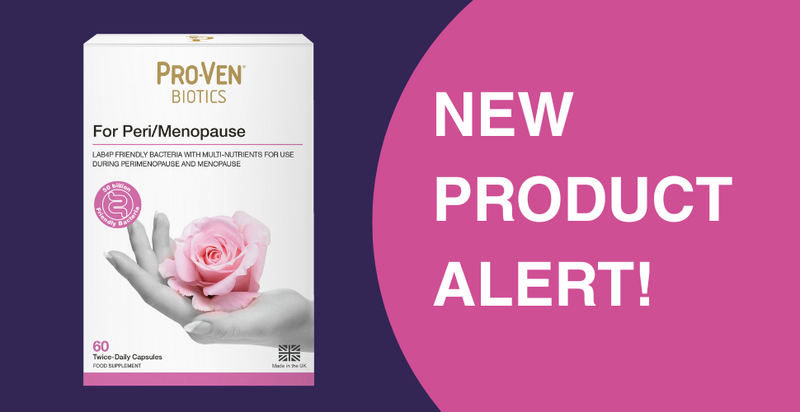
Putting the 'Me' in Menopause
Perimenopause and menopause are a personal journey for each individual woman - at ProVen Biotics, we want to acknowledge this and support you with information and products that can help your unique experience.
Perimenopause and menopause have taken on a life of their own in the past couple of years. At least 34 (and up to around 50) different symptoms of this stage of life have been identified to date and it can feel like almost every ailment in women over 35 is attributed to perimenopause and that we are falling apart as we experience a range of these symptoms simultaneously.
If you fit into either of these categories, we would like to reassure you that you are not alone - and you're experience is unlikely to be the same as anybody else, which can also be difficult to understand and manage.
At ProVen Biotics, we have had many conversations with women aged 35+ who are wondering how to navigate the next 20 years and we are launching this page as a hub for all of our knowledge, wisdom and understanding.
Over the coming months, we will be adding more and more content here and for Menopause Awareness Month, this October, we are launching a brand new product specifically for women in perimenopause and menopause, and offering gut clinic appointments for further support.
"In my years caring for patients, I know one thing is for certain: there is no such thing as a textbook menopause."
Dr Naomi Potter, in Davina McCall's 'Menopausing' book
All-round support for menopause
Introducing our brand-new scientifically-designed product developed specifically to provide all-round support for women in the peri/menopause phase of life.
With 50 billion research-backed live bacteria, Ashwagandha, Soy extract, Milk Thistle, and a range of vitamins and minerals that specifically support symptoms associated with perimenopause and menopause.
Frequently Asked Questions
What is the link between peri/menopause and the microbiome?
What is the link between peri/menopause and the microbiome?
There is a bi-directional link between our hormones and the bacteria in our gut microbiome, with specific bacteria species and strains impacting levels of hormones and hormonal levels impacting the gut bacteria. At the same time as oestrogen declines during menopause, the diversity in our gut microbiome also starts to reduce.
Some of the symptoms associated with perimenopause and menopause can be directly linked to shifts in the gut microbiome, including digestive issues and bloating, weight gain and other metabolic changes. In addition, there is increasing evidence linking gut health and the microbiome to the brain and mental and emotional symptoms, and to other more general health issues, including sleep and skin.
We also have a vaginal microbiome, which is dominated by Lactobacillus bacteria species, which help to support the pH of the vagina and the genito-urinary tract. The numbers of Lactobacillus bacteria in the vaginal microbiome can also decline as we age and these changes have been linked to menopausal symptoms, such as vaginal atrophy and dryness.
What can I do to support my gut health and microbiome?
What can I do to support my gut health and microbiome?
Start with diet – include fermented foods, which directly contain friendly bacteria and can help to support the bacteria in our microbiome. Suggestions include live yoghurt, sauerkraut, kefir and kombucha.
The live bacteria in our microbiome themselves feed of undigestible fibres, known as prebiotics, and these can be found in foods such as raw onions, garlic and leeks. Under-ripe bananas are also known to be a good source, along with Jerusalem artichokes, asparagus, and most fibrous vegetables (including beans).
Both friendly bacteria (probiotics) and fibre (prebiotics) are available in supplement form and our new ProVen Biotics For Peri/Menopause contains 50 billion friendly bacteria per serving (2 capsules) with a wide range of other nutrients specifically selected for women in perimenopause and menopause.
What are the main misconceptions around menopause and gut health?
What are the main misconceptions around menopause and gut health?
There has been a belief that menopause is all about hot flushes and weight gain and has little or nothing to do with nutrition and/or gut health. Regardless of whether a woman is taking HRT or not, supporting our body with a healthy diet and lifestyle, and some key supplements is essential for supporting gut, brain and overall health.
It is also important to note that perimenopause and menopause are not a single problem to be solved in the same way for all women or even with the same strategies throughout the menopausal journey. A woman can experience very different issues and symptoms in her mid 40s compared to when reaching menopause around age 50 and then during post-menopause, and will need to adapt her diet and lifestyle to support each stage.
What key nutritional factors may provide support for the gut and overall health through peri/menopause?
What key nutritional factors may provide support for the gut and overall health through peri/menopause?
Some key areas to consider include the following:
- Increase protein intake to support muscle mass and cell replenishment, but do not ignore complex, fibre-rich carbohydrates, which can provide energy and food for the gut bacteria.
- Remember that we need a wide variety of vitamins and minerals to support the healthy function of the body’s biochemical pathways, so a diet rich in fruits and vegetables, with animal protein is optimal. Vegetarians and vegans need to ensure that they are eating adequate protein and getting the vitamins and minerals they need each day.
- Fat is not the enemy, but we may not be able to eat as much as we once did, particularly if we are more sedentary and not including daily exercise or movement in our schedule. Healthy fats to consider include avocado, oily fish (salmon, sardines, mackerel), nuts, seeds, olive oil, coconut oil and even butter.
- Specially selected supplements can help to support a healthy diet, but we do not need to include handfuls of supplements every day. A multivitamin and mineral can be a useful support, along with omega-3 and a friendly bacteria supplement to support the gut.
- It is worth considering where we are snacking and/or grazing, as we may not need to eat as often if we are moving less and changes to our metabolism and hormones can mean that we are more likely to store any excess in the form of fat.
There is so much information available around supplements and nutrition for peri/menopause, how do we know where to start?
There is so much information available around supplements and nutrition for peri/menopause, how do we know where to start?
Start simple. Make small changes to your diet one-by-one so that you can assess the impact of any changes. For example, add more fibre for a week to assess gut changes, then move on to focusing on hydration, then protein and so on.
Supporting the microbiome can be a great starting point as the gut is central to health and is increasingly being linked to so many bodily systems – the gut-brain axis, gut-lung axis, gut-skin axis, and of course the genito-urinary system.


